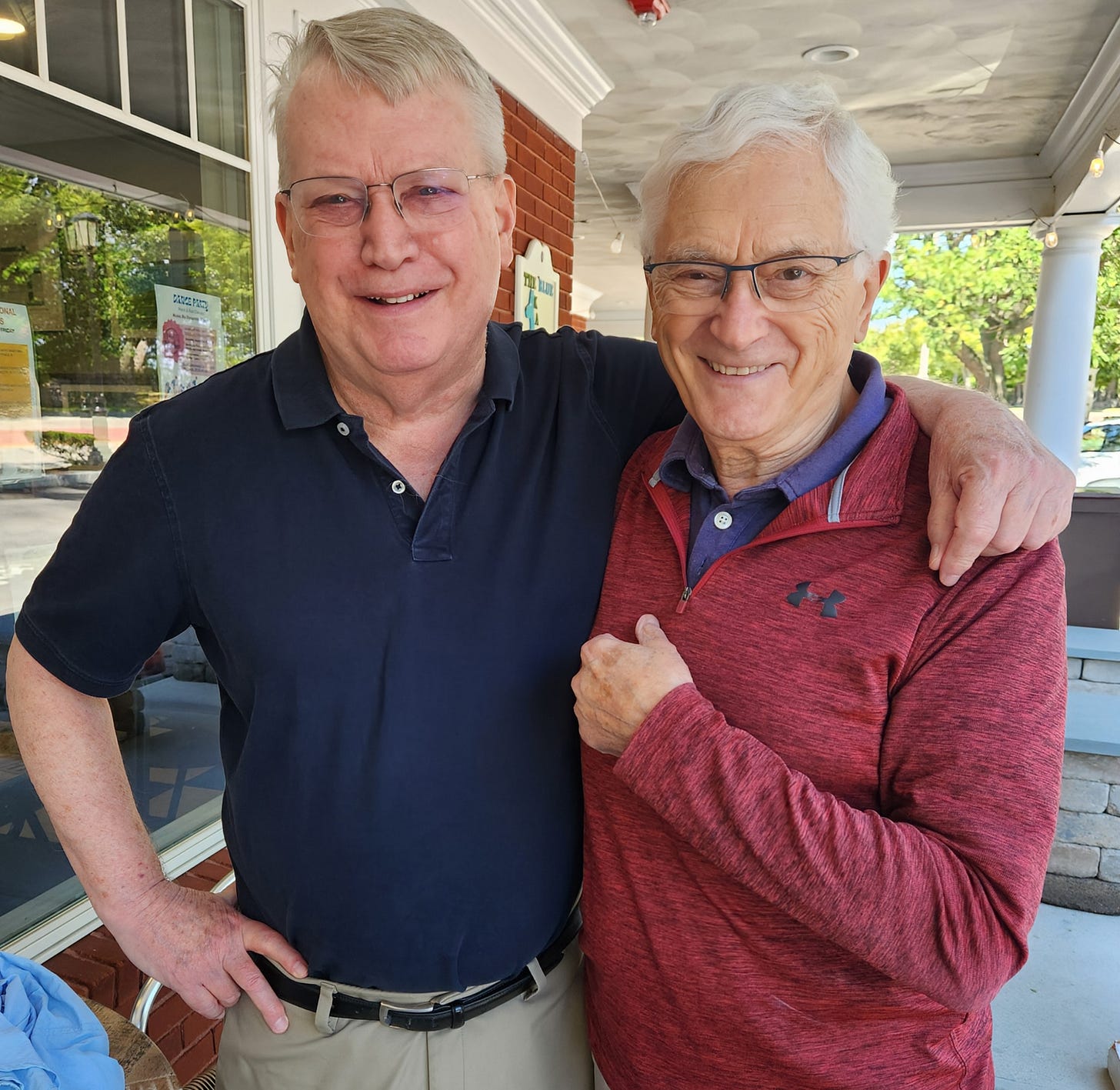Conversation with a Historian
. . . the historian? Why Luther Spoehr** of course
As a physician, I know what it takes to be a medical professional. Now, as an enthusiastic amateur historian, I wonder what it takes to be a professional one.
There’s the stereotype, of course: somber, serious, most likely found in a dark, dusty archive, oblivious to surroundings, squinting in search of the obscure. But I wondered…
I first met Luther Spoehr when we were Board members of the Rhode Island Historical Society. Luther also served as Chair for a three-year term. I was impressed by both his obvious knowledge of history and his ability to guide the meetings congenially through the day’s agenda.
I thought it would be interesting to find out more about how he became so engaged with history that he has studied it, taught it, written about it, and discussed it for over half a century.
After driving through historic Bristol and historic Warren, to get myself in the properly past-focused mood, I met him at a non-historic Barrington coffee shop.
I was interested in Luther’s career. Turns out it started rather early: his father, a physician, loved history and introduced Luther, at about age 9, to Landmark Books. On the dust jacket of each volume: “Any pre-adolescent who has not feasted on them has been cheated.” Luther was not cheated. “I loved the stories,” he says.
Introduced to more analytical approaches in high school AP history classes, brilliantly taught by “the best teacher I ever had,” he went off to Haverford College knowing he’d major in history. But…a career?
The history bug, however, had bitten. After graduation, he went off to Stanford for history grad school, a 4-year fellowship letting him ride what turned out to be the final wave of an era of generous funding. Researching and writing in turbulent times, he wrote a dissertation about Stanford’s first president, who experienced some turbulent times of his own, including some notorious academic freedom cases.
After coming to Rhode Island in 1974, he devoted the next half-century to teaching and writing about history, engaging high school students at Lincoln School and undergrads at Brown, apprentice and advanced professionals. He consulted for the APUSH program, coauthored a book about how to handle the “Document-Based Question,” and traveled from New England to Indiana to Louisiana as the history curriculum consultant.
Beyond the classroom, writing about history for the proverbial (and elusive) “general reader,” he published over 250 reviews, many in the Providence Sunday Journal (back when its “Books” section allowed reviewers 800 words). “Lots of ministers and teachers in my family tree,” he says. “Sometimes I think I’ve spent the last 45 years doing missionary work for the study of history.”
It can be a tough sell. Like Dickens’ Mr. Gradgrind, some students (and their parents, and even—shudder—some teachers) think (or fear) that “Facts alone are what is wanted in life.” Luther’s point: “You can’t teach history without facts. But you also can’t teach it only with facts.”
After all this time, he’s boiled it down to two rules. First, “Make it real.” He points to Doris Kearns Goodwin’s No Ordinary Time: “You can almost smell the smoke from Churchill’s cigar when he’s meeting FDR at the White House.” Or David McCullough’s John Adams, wedging himself below decks to get through a violent storm at sea on his way to Europe.
Second, “Make it matter.” Young and old alike “quite reasonably ask, ‘So what?” he says. “We need to be able to answer—with specifics, linking past to present, their world to ours.” Then, when we insist that they engage, they will be much more willing to do so.
Our conversation went wide and deep. Discussing how understanding his “3 C’s” (Contingency, Complexity, Context) and “2 E’s” (Empathy, Evidence) prevents oversimplifying or jumping to conclusions. (In Luther’s case, I think we can add Energy and Enthusiasm to the list.). Considering how two of his favorite discussion-starters--L.P. Hartley’s “The past is a foreign country; they do things differently there” and Faulkner’s “The past is never dead. It’s not even past”—might both be true.
Then we had to be on our merry way. What a great conversation. Even though we barely touched on his interview with Mel Parnell, one of my Red Sox favorites, for a sports biography dictionary. We’ll do it again. There’s history to be made, in more ways than one.
** Edited by Luther Spoehr
Copyright 2025



What a wonderful conversation and mentor. Thanks for sharing him with us.
Ed, you know you touched a soft spot...history. Though I never completed my PhD. thesis due to my father's illness and taking over the family business when in peril, I remain a historian when watching news broadcasts, reading the papers, and talking with friends. Unlike
Thucydides who coined the linear view of history, my approach has always been Herodotean, "life is cyclical." The cast of characters we have today are no better nor worse than those who preceded them. Yes, Ancient History remains alive in the 21st Century.